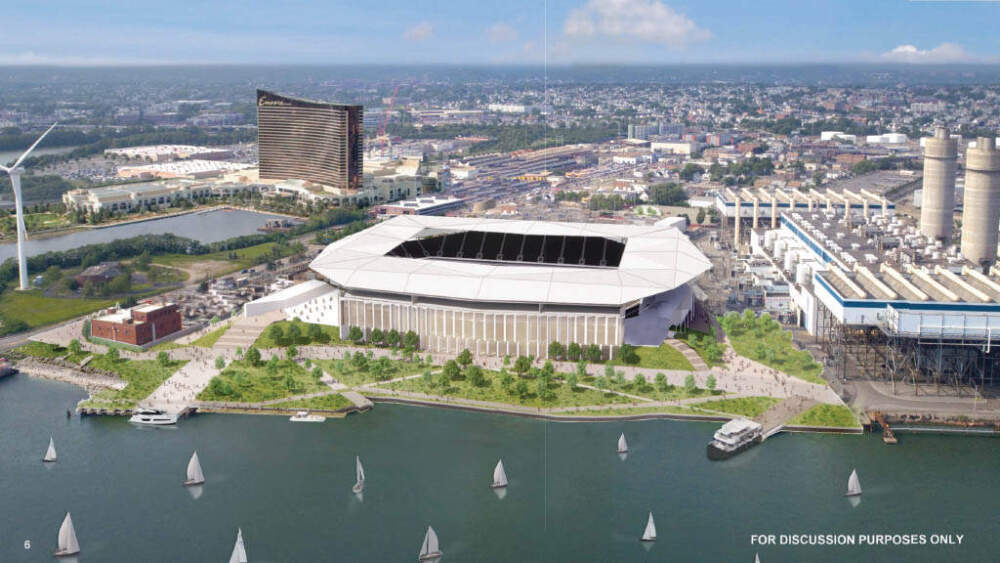Advertisement
Mayors and team owners battle over proposed Everett soccer stadium

The public battle over whether to build a Major League Soccer stadium on the banks of the Mystic River in Everett hit the State House on Tuesday, and it's being waged by some of the region's biggest names in sports and politics.
State lawmakers heard hours of testimony on a bill that would re-zone a blighted portion of the Everett waterfront to allow construction of a stadium proposed for the New England Revolution. The team is owned by the Kraft Group, which also owns the New England Patriots.
"Everett is still fighting to emerge from its former industrial past," Everett Mayor Carlo DeMaria said Tuesday. The city "needs the same opportunity to redevelop this area that surrounding communities have already enjoyed, like the Seaport in Boston, Assembly Row in Somerville and Kendall Square in Cambridge."
As currently conceived, the plans are for a 25,000-seat stadium surrounded by grassy parks, according to a rendering presented by the Kraft Group. They would replace the old smokestacks and industrial buildings at the site, part of a shuttered and contaminated power plant.
Brian Bilello, president of the New England Revolution, said a new stadium would serve as a "catalyst for environmental rehabilitation, and provide new public waterfront access to the region." Bilello said the Kraft Group signed agreements with local trade unions promising the facility would be union built and operated, and several union leaders also testified in support.
But critics say the legislation is a carve-out for a deep-pocketed developer.
"It has all the markings of a special deal for a single developer, a single project that affects a statewide issue," Conservation Law Foundation President Brad Campbell said in an interview.
Campbell argued the site's designated port zoning should be carefully considered and not removed piecemeal, especially as Massachusetts becomes a growing launching point for offshore wind infrastructure.
And more opposition emerged at Tuesday's hearing from Everett's neighbor to the south. Multiple officials from the city of Boston raised questions about why they were left out of the initial planning stages, echoing previous comments from Mayor Michelle Wu.
"Boston, and most particularly Charlestown, will bear the brunt of transportation-related impacts," Boston Chief of Planning Arthur Jemison said. "Boston needs to be at the table."
The red flag from the Wu administration comes even as she is pushing to rehabilitate an old stadium in Boston's Franklin Park to attract a women's professional soccer team.
And there are other Boston sports magnates in the mix. The Jacobs family, owners of the Boston Bruins and TD Garden, are apparently concerned about competing to host concerts and events with a new venue across the water. TD Garden played a key role in killing an earlier proposal to re-zone the land as part of a supplemental budget late last year.
“TD Garden definitely had weighed in, in terms of the conversation,” House Ways and Means Chairman Aaron Michlewitz told reporters at the time.
A spokesperson for TD Garden and parent company Delaware North did not respond to a request for comment Tuesday.
"The opposition from TD Garden and from Boston, quite honestly I don't think makes much sense," said Victor Matheson, a sports economist at the College of the Holy Cross in Worcester.
Matheson said evidence from other Major League Soccer stadiums around the country shows they don't typically host many large concerts or live events. "We see a tiny handful of concerts in these things," he said.
"Concerns about some sort of negative economic impact on Boston are just not likely to be the case, unless, of course, you're asking for several hundred million dollars of taxpayer money," he said. Studies show publicly subsidized stadiums rarely provide a good return on investment and saddle cities and states with large amounts of debt.
The Kraft Group is not currently asking for large-scale public financing for the stadium. If that changes, "opposition shouldn't just go to TD Garden and the mayor, it should go to every taxpayer, including me, despite the fact I'm a huge MLS fan," Matheson said.
As it stands now, the future of the entire project depends on whether the legislature chooses to act on the zoning change before the end of the session in July. And with concerns coming from the mayor of Boston, TD Garden, and the powerful North End-based House Ways and Means chairman, there's a tight needle to thread for the Kraft Group, the Everett political establishment and New England Revolution faithful.
"The Revs need the Boston metro area a lot more than the Boston metro area needs the Revs," Matheson said.
